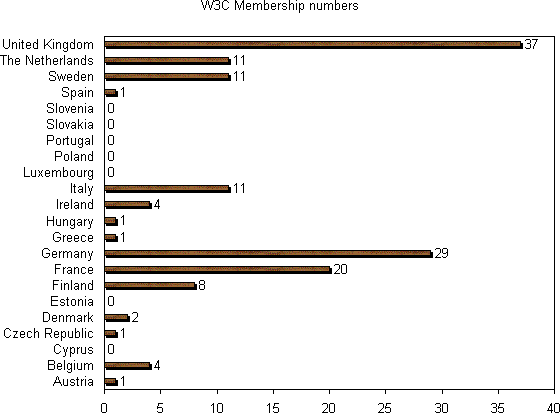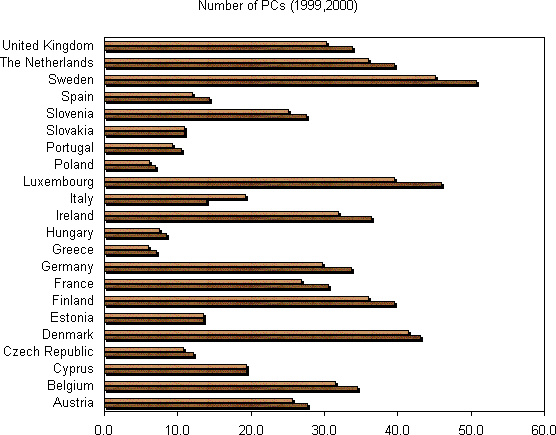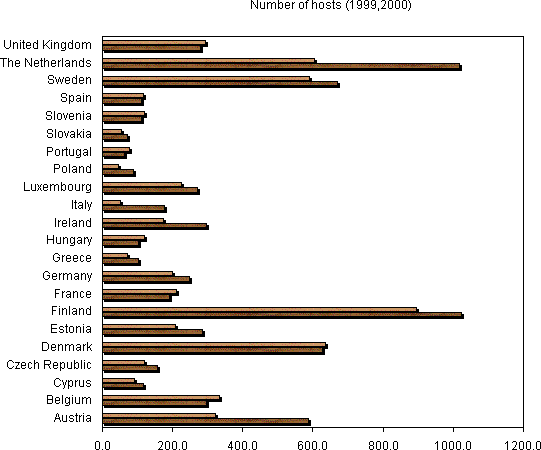Analysis of W3C Office Coverage
in Europe
Project acronym: QUESTION-HOW
Project Full Title: Quality Engineering Solutions via Tools,
Information and Outreach for the New Highly-enriched Offerings from W3C:
Evolving the Web in Europe
Project/Contract No. IST-2000-28767
Workpackage 3, Deliverable D3.1
Project Manager: Daniel Dardailler <danield@w3.org>
Author of this document: Ivan Herman <ivan@w3.org>
Date: 29 November 2001.
Introduction
This report gives an overview of the current coverage of W3C presence
through the network of Offices, and compares it with relevant statistical and
other data. The goal of the report is to work out the detailed plans within
the QH project directed to a better overall coverage within the European
Union. The QH project envisages two parallel actions in this respect
(Workpackages 3 and 4), namely:
- Regionalization of current offices
- Establishment of up to four offices, two in the current EU countries,
and two in the candidate states
As a result of our analysis concrete plans for both Workpackages is now
available, outlined below, which will be implemented in
the following phases of the QH project.
Collected data
The following data contributed to the final decisions:
- Current membership in W3C per countries
- The data reflect a snapshot of the W3C membership database of autumn
2001; although variations occur, they do not alter the overall
conclusions
- Statistical data on the Internet/Web presence in various countries
- The analysis aimed at using publicly available data on:
- Number of PC's per country
- Number of hosts per country
I was felt that these data give an adequate measure of the internet
'activity' in an area. The various sources which were considered to
find these data included:
Unfortunately, it is notoriously difficult to collect and compare these
types of data, because the statistical methods used by various
organizations differ. Finally, the ICT statistical data, published by
the ITU, were retained for the purposes of this analysis. These reports
have indeed the advantage to collect both types of data together, ie,
the statistical methods used are (probably) similar. The two documents
(freely available on the net) are:
Using both the 1999 and 2000 data allows to map some trends, too.
- GDP data (GDP per capita, GDP growth)
- These data could be collected from several sources. The data
published by the World Bank, at http://www.worldbank.org/data/countrydata/countrydata.html
was used in the present report. (To normalize the results, the country
population data was also used, available from the same source.)
It must be noted that the GDP and Internet data stem from the period
before the current economical downturn and they certainly do not
reflect the possible consequences of the September 11 events. However, it is
believed that the main trends and results remain valid on long term (and
setting up new offices and/or regionalizing a current office is certainly a
long-term investment).
The data themselves
The following table shows all the collected statistical data:
|
Population |
GDP per capita |
GDP real growth rate (1999) |
Personal computers 2000 (per 100) |
Internet Hosts 2000 (per 10000) |
Personal computers 1999 (per 100) |
Internet Hosts 1999 (per 10000) |
% change in PC-s. |
% change in hosts |
No. of W3C members |
| Austria |
8,100,000 |
$25,430 |
2.10% |
27.7 |
588.5 |
25.7 |
321.2 |
7.7% |
83.2% |
1 |
| Belgium |
10,200,000 |
$24,650 |
2.50% |
34.5 |
295.4 |
31.5 |
334.3 |
9.3% |
-11.6% |
4 |
| Cyprus |
760,500 |
$11,950 |
4.50% |
19.3 |
117.6 |
19.3 |
92.5 |
0.0% |
27.2% |
0 |
| Czech Republic |
10,300,000 |
$5,020 |
-0.20% |
12.2 |
155.5 |
10.7 |
119.1 |
13.8% |
30.5% |
1 |
| Denmark |
5,300,000 |
$32,050 |
1.70% |
43.2 |
626.6 |
41.4 |
636.6 |
4.2% |
-1.6% |
2 |
| Estonia |
1,400,000 |
$3,400 |
-1.10% |
13.5 |
284.3 |
13.5 |
208.7 |
0.0% |
36.2% |
0 |
| Finland |
5,200,000 |
$24,730 |
4.00% |
39.6 |
1022.5 |
36.0 |
894.0 |
10.0% |
14.4% |
8 |
| France |
58,600,000 |
$24,170 |
2.90% |
30.5 |
190.9 |
26.8 |
210.4 |
13.7% |
-9.3% |
20 |
| Germany |
82,100,000 |
$25,620 |
1.50% |
33.6 |
248.3 |
29.7 |
199.0 |
13.3% |
24.8% |
29 |
| Greece |
10,500,000 |
$12,110 |
3.40% |
7.1 |
103.9 |
6.0 |
70.7 |
17.1% |
47.0% |
1 |
| Hungary |
10,100,000 |
$4,640 |
4.50% |
8.5 |
102.1 |
7.5 |
119.1 |
13.9% |
-14.3% |
1 |
| Ireland |
3,800,000 |
$21,470 |
9.80% |
36.5 |
296.4 |
31.9 |
172.5 |
14.5% |
71.8% |
4 |
| Italy |
57,600,000 |
$20,170 |
1.40% |
13.9 |
178.0 |
19.2 |
52.6 |
-27.3% |
238.5% |
11 |
| Luxembourg |
432,000 |
$42,930 |
7.50% |
45.9 |
271.2 |
39.6 |
224.0 |
15.9% |
21.0% |
0 |
| Poland |
38,700,000 |
$4,070 |
4.10% |
6.9 |
87.7 |
6.2 |
44.2 |
11.1% |
98.3% |
0 |
| Portugal |
10,000,000 |
$11,030 |
3.00% |
10.5 |
62.0 |
9.3 |
77.8 |
12.7% |
-20.3% |
0 |
| Slovakia |
5,400,000 |
$3,770 |
1.90% |
10.9 |
70.2 |
10.9 |
55.2 |
0.0% |
27.2% |
0 |
| Slovenia |
2,000,000 |
$10,000 |
4.90% |
27.6 |
110.1 |
25.1 |
118.5 |
9.7% |
-7.0% |
0 |
| Spain |
39,400,000 |
$14,800 |
3.70% |
14.3 |
112.2 |
11.9 |
116.8 |
19.7% |
-4.0% |
1 |
| Sweden |
8,900,000 |
$26,750 |
3.80% |
50.7 |
670.8 |
45.1 |
590.1 |
12.3% |
13.7% |
11 |
| The Netherlands |
15,800,000 |
$25,140 |
3.60% |
39.5 |
1017.5 |
36.0 |
605.5 |
9.7% |
68.0% |
11 |
| United Kingdom |
59,500,000 |
$23,590 |
2.10% |
33.8 |
280.8 |
30.3 |
292.3 |
11.7% |
-3.9% |
37 |
The table includes the collected data for all EU countries plus the
strongest candidates to the EU at the time of writing this report. Note that,
although a participant of the QH project, data for Israel are not listed; due
to the present political situation it is indeed impossible to include Israel
in any kind of regionalization project. Countries where an office or the
European host operate have been highlighted in the table.
The following few charts, extracted from the table, allow for a better
appreciation of some of the conclusions:

Figure 1: Number of W3C members in the
various European countries.

Figure 2: Number of PC-s per 100
inhabitants in various European countries. The top and the bottom row for
each country represent the data for 1999 and 2000, respectively.

Figure 3: Number of Internet hosts per
10,000 inhabitants in various European countries. The top and the bottom row
for each country represent the data for 1999 and 2000, respectively.
Analysis
Although some of the trends, reflected in the data, are well known (eg,
the strong internet presence of the Nordic countries), some conclusions are
important from the project's and W3C's point of view.
- There are a number of countries where the local internet activity
measured, for example, by the number and the evolution of internet hosts
and/or PCs is high but the number of W3C is comparatively quite low. In
other words, these countries are "underrepresented" in W3C. The clear
examples are: Austria and Denmark, but even Finland, Ireland, or Belgium
fall into this category.
- The presence of an office or the European host has a clear positive
effect on the evolution of membership, hence the presence and influence
of W3C technologies. In spite of its undeniable industrial strength one
could argue, for example, that the large number of UK members is an
"overrepresentation". Obviously, this is only for the sake of the
argument; the goal is not to reduce those numbers but to increase the
numbers in other countries!
- Some countries, mainly Spain and Portugal, are still on the lower end
of the scale in terms of Internet presence. This is in contrast with the
relatively large growth in GDP of both countries. It could be expected
that a strong local office might play a beneficial role in the local
evolution in web technologies.
- Among the potential new EU members, the level of Estonia and of
Slovenia in terms of those statistics are both impressive; they score
better than some of the current EU countries. A relatively low population
in these countries does not make them a proper choice for a full-blown
office, but it is worth noting this strength nevertheless; a conclusion
might be that it is beneficial to include them in regional initiatives,
if possible.
- Looking at the larger candidate countries, the Czech Republic and
Hungary score relatively well, with Poland a bit behind them. The GDP
evolution of Hungary and of Poland are impressive, and this makes them
good targets for further "investment". However, only Hungary has a stable
W3C member; there have been Polish and Czech members in the past, but
none of them stayed too long. (The Hungarian member, SZTAKI, has been a
stable member ever since the creation of W3C.)
One has to emphasize, though, that planning for new offices and/or for the
regionalization of existing offices cannot be done based exclusively on cold
statistical data. A number of other factors, not expressible by numbers,
influence the decisions:
- Local contacts.
- An office cannot operate without the dedication of local persons and
without a local institution ready to take the possible load of an
office. Actively seeking out such institutions have been part of the
work reported here, and has greatly influenced the current
decisions.
- Linguistic issues
- The role of an office is, also, to be a local "point of contact" for
W3C in the country. This is a major constraint on regionalization.
- Cultural, political issues
- W3C has to consider possible cultural incompatibilities, historical
grievances, etc. W3C certainly wants to avoid finding itself in the
midst of such problems. Consequently, during the past period, W3C has
contacted the representatives of all W3C members, but also other
organizations, private contacts, etc, to address these issues (eg, "how
would the Irish community feel about being represented from
Oxford...").
Based on all considerations, the plans for the QH projects are as
follows.
Regionalization Plans (Workpackage 3)
- With a start in 2002:
- UK & Ireland office, extending the current UK office
- The current office host (RAL) has already good contacts with
the academic circles in Ireland (eg, at the Trinity College),
which is a good basis for start. Discussions with the
representatives of Irish W3C members showed a great interest for
such an extension of the UK office.
- Office for Germany and Austria, extending the current German
office
- The contacts between the German and Austrian technological and
industrial communities are traditionally good, and various
professional societies, like for example the German GI
(Gesellschaft für Informatik) have regularly meetings with their
Austrian colleagues. As the statistics shows, Austria is clearly
underrepresented in W3C, but the relatively small population of
the country does not make it a primary target for a separate
office. In view of the linguistic facilities, creation of a
joined German and Austrian office is the best solution. Note that
the final name of the office is still not decided.
- Benelux office or Dutch-Flemish office, extending the current
Dutch office
- That there is a need for a presence in Belgium is clear from
the statistics, and the closeness of the Dutch office leads to
the obvious choice for regionalization in the area. The
relationship between Dutch and Flemish industry, academics, are
traditionally excellent.
At the moment of writing this report it is still not clear
whether the Dutch office could be extended to the whole of the
Benelux; the problem is obviously the linguistic issue. The Dutch
office is currently exploring the possibilities, based on a
dedicated cooperation on the matter with the European (ie,
French) host. If the final answer is not to establish a
full-blown Benelux office, then the plan is that the French host
will engage into a more active representation in Wallonia and in
Luxembourg.
- With a start in 2003:
- Scandinavian office (ie, Sweden, Denmark, and Norway), extending
the current Swedish office
- Cooperation based on Scandinavia is already traditional, and
this therefore is an obvious choice for regionalization. The very
strong presence of the Nordic countries in the internet area
makes it clearly necessary to have a regional presence of W3C.
Although Danish, Norwegian, and Swedish are not identical, these
languages are close enough to make such a regional office viable.
However, at this moment, the Swedish office is undergoing some
internal changes, and it is not feasible to start this action in
2002 already.
- Greek and Cyprus office, extending the current Greek office
- Linguistic and cultural bounds make this regionalization step
quite natural. However, the Greek office is currently busy
reinforcing its presence in Greece; it is therefore not feasible
to start this action in 2002.
New offices (Workpackage 4)
- In current EU countries
- Finland
- Although a relatively small county in term of population,
Finland is clearly an important player in the Internet area.
Linguistically "isolated", it is not feasible to include Finland
into a regional office of some kind, eg, a Scandinavian office.
Hence the plan to establish a separate office there. Note that
the first contacts in Finland also included the possibility to
establish a regional office from the start, including Estonia,
too: the two languages are almost identical, and there has been
traditional bounds between the two countries, mainly in the last
10 years. In view of what has been said about Estonia, this would
clearly be the best solution.
- Spain
- As described above, this country is clearly underrepresented,
not only in the W3C are but on the Internet, too. The first
discussions with local contacts have revealed that linguistic
issues play an important role in this, insofar as the local
community is not fluent enough in English to closely participate
in the usage and the dissemination of W3C technologies. Coupled
with a strong translation programme, a Spanish office could play
a very important role for W3C, with an effect in the whole
Latin-American community, too.
It can also be envisaged to enlarge a Spanish office later into
an Iberian office, although the feasibility of such a move (in
view of some existing animosity between Spain and Portugal, as
well as linguistic differences) is not clear.
At this moment it is not clear which of these two offices will be
established in the first phase of the project, and which in the second.
W3C is working on both, trying to find the local contacts and
institutions which might be willing to engage into this activity, but
there is no conclusive result yet.- In the candidate EU states
- Hungary
- As shown by the statistics, this is one of the strong countries
in the area, with a stable W3C member that has already expressed
its interest in establishing an office. Similarly to Finland, the
linguistic isolation of the country makes it difficult to include
Hungary in any larger regional office. There are good chances for
an office to be established in 2002.
- Czech Republic, Slovakia, and/or Poland
- At this moment it is not clear which of these countries could
host an office in the second part of the project. There are pro
and contra arguments for all three of them (with the case of
Slovakia being a bit weaker, again looking at the statistics)
and, at the end of the day, the quality of local contacts and
possible institutions may become the decisive factor.
Linguistically, the three countries are not very different
(people mutually understand one another), so a regional office
would not be excluded either. This will depend on the suitable
institution coming forward.
If these plans are implemented, a close to 100% "coverage" of today's
European Union, as well as some of the new members possibly joining the union
in 2004, will be achieved.
Ivan Herman, Head of Offices (ivan@w3.org)
Last revised: $Date: 2002/08/22 11:39:24 $



